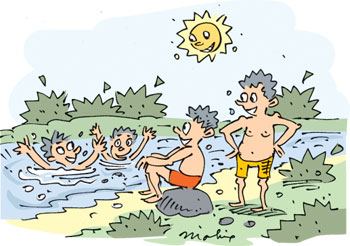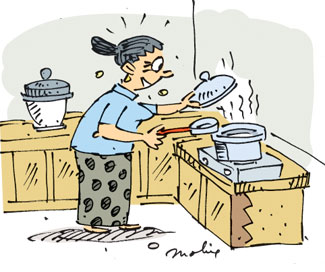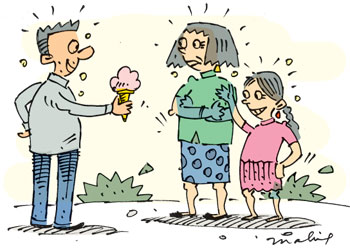|

by R. S. Karunaratne
Reflective pronouns
A reflective pronoun is used as the object in a sentence to show that
the subject and the object are the same person or thing.
Mala bought herself a sari.
Sometimes I blame myself for my mistakes.
Jayantha himself designed the building.
The boys cleaned themselves in the river.
|

The boys cleaned themselves
in the river. |
He made himself ill by drinking excessively.
Here is a simple guide to reflective pronouns:
Subject pronouns (Singular): I, you, he, she, it
Reflective pronouns: myself, yourself, himself, herself, itself
Subject pronouns (Plural): We, you, they
Reflective pronouns: ourselves, yourselves, themselves
A reflective pronoun when used as an object can come immediately
after a verb or a preposition in a sentence.
Damith introduced himself to the class.
I was angry with myself for losing my National Identity Card.
The controller himself explained how to obtain a passport.
You must give yourself more time to solve the problem.
You must behave yourself at the party.
To emphasise that a person does something without any help, the
reflective pronoun is used at the end of the sentence or immediately
after the subject.
Mother cooked the meal herself.
Mother herself cooked the meal.
Jaya solved the maths problem himself.
Jaya himself solved the maths problem.
Gamini, you should write the story yourself.
Gamini, you yourself should write the story.
Reflective pronouns are used in certain phrases which have special
meanings.
Boys, enjoy yourselves! (= have fun)
Lunch is ready. Help yourself!
Girls behaved themselves at the birthday party. (=They behaved well)
After a few minutes with my friend I made myself at home. (= I behaved
as if I was in my own home)
[Activity]
Put the reflective pronoun in the right place and check your answers
with the key.
1. Our cricket players outdid when they won the match. (themselves)
2. Meena hurt while she was cleaning some fish. (herself)
3. The teacher solved the difficult maths problem. (himself)
4. Renu made some sandwiches for breakfast. (herself)
5. She managed the household affairs while her husband was abroad.
(herself)
6. I was pleased myself for completing all the assignments. (myself)
7. As you have damaged my building, be prepared to pay compensation.
(yourself)
8. Lucky drove the car and knocked down a pedestrian. (himself)
9. Sam blamed for his foolish behaviour. (himself)
10. Police said the suspect shot before he could be arrested. (himself)
|

Mother cooked the meal herself. |
Key:-
1. Our cricket players outdid themselves when they won the match.
2. Meena hurt herself while she was cleaning some fish.
3. The teacher himself solved the difficult maths problem.
4. Renu herself made some sandwiches for breakfast.
5. She herself managed the household affairs when her husband was
abroad.
6. I was pleased with myself for completing all the assignments.
7. As you yourself have damaged my building, be prepared to pay
compensation.
8. Lucky himself drove the car and knocked down a pedestrian.
9. He blamed himself for his foolish behaviour.
10. Police said the suspect shot himself before he was arrested.
Current English usage
Being a living language English is subject to change from time to
time. In addition, English absorbs words from foreign languages such as
French and German. Therefore, it is useful to know the words used in
current English.
1. actually, virtually, really
‘Actually’ is a grossly overused word. “Actually’ and ‘really’ mean
‘in fact’. Did she actually call me a fool? ‘Virtually’ means ‘in
effect’. The undergraduate virtually admitted that he assaulted one of
his lecturers.
2. adapt, adopt
To ‘adapt’ means ‘to change something to suit different conditions’.
It took a long time for him to adapt himself to his new surroundings. To
‘adopt’ is to take over something or somebody as one’s own. The
childless couple decided to adopt a child.
3. adjacent, adjoining, contiguous
‘Adjacent’ means ‘close to each other’. Our school is adjacent to the
public park. ‘Adjoining’ means ‘to be next to or joined to something’.
We stayed in adjoining rooms in a luxury hotel in Malaysia. ‘Contiguous’
means ‘touching or next to something’. India and Bangladesh are
contiguous countries.
4. Adjudge, adjudicate
To ‘adjudge’ is to decide judicially in a court of law. It is usually
used in the passive voice.
The business organisation was adjudged bankrupt. ‘Adjudicate’ means
‘to give an official decision when there is a dispute between two
organisations. A select committee will adjudicate disputes among
parliamentarians.
5. Administer, minister
‘Administer’ is to treat or tend to somebody.’ The drug was
administered to the child by a pupil nurse. ‘Minister’ means ‘to care
for a patient.’ The nurse ministered to her patient’s medical needs.
6. Admit
‘Admit’ means ‘to agree often unwillingly that something is true. The
thief admitted committing three burglaries. Some people refuse to admit
the truth.
7. Adopted, adoptive
When a child is adopted, those who adopt him become adoptive parents.
Kevin is their adopted son. The word ‘adoptive’ usually goes before a
noun.
8. Advantage, benefit
An ‘advantage’ is ‘a situation that favours success.’ He had the
advantage of a university education. ‘Benefit’ is ‘an advantage that
something gives you.’ She had the benefit of a good education.
9. Adventitious, adventurous
‘Adventitious’ means ‘happening by chance, not planned.’ Natural
disasters are adventitious. ‘Adventurous’ means ‘willing to take risks
and try new ideas’. For the adventurous youth mountain climbing is an
ideal sport.
10. Affection, affectation
‘Affection’ means ‘fondness or attachment’. Children need a lot of
love and affection. ‘Affectation’ means ‘a pretence.’ She raised her
eyebrows with an affectation of surprise. (= She was pretending to be
surprised.)
Starters:
Hints on spoken English
Apart from learning basic grammar, starters will have to be familiar
with terms used in spoken English. We use 'I am, I do, I don't, I can, I
can't, It is, I have, I haven't, I will, I won't, I did, I didn't, etc.
in spoken English.
I'm hungry.
I'm not hungry.
A: Do you attend tuition classes?
B: Yes, I do.
C: No, I don't.
|

I don’t like ice-cream but my sister does. |
I haven't got a pen but my friend has.
A: Please help him.
B: I'm sorry. I can't.
A: Are you hungry?
B: Yes, I am.
B: No, I am not.
A: Do you think Sara will pass the exam?
B: She might.
A: Are you leaving?
B: Yes, I'm afraid I must.
A: Is it raining?
B: Yes, it is.
C: No, it is not.
A: Have you ever been to India?
B: Yes, I have.
C: No, I haven't.
A: Will Sara be here tonight?
B: Yes, she will.
C: No she won't.
Use 'do' and 'does' for the present simple.
I don't like ice-cream but my sister does.
Some people work hard but I don't.
A: Do you enjoy what you do?
B: Yes, I do.
C: No I don't.
Use 'did' for the past simple.
A: Did you and Sunil break the window?
B: Yes, I did but Sunil didn't.
A: Did it rain yesterday?
B: Yes, it did.
C: No, it didn't.
A: Did he come to school yesterday?
B: Yes, he did.
C: No, he didn't.
Contractions :
You can use contractions at the beginning or middle of a sentence.
But you can't use
them at the end of a sentence.
A: Are you hungry?
B: Yes, I am. (NOT Yes, I'm.)
A: Is she typing the letter?
B: Yes, she is. (NOT Yes, she's)
A: Are they coming tonight?
B: Yes, they are. (NOT Yes, they're.)
Activity :
Complete the following sentences with suitable verbs. Check your
answers with the key.
1. Irene wasn't angry but I ................
2. You haven't passed the exam but she ................
3. Nayomi can't dance but all her friends ....................
4. I'm not a scholar but you ...................
5. We are not going to the party but Nayana .................
6. This house isn't big but the garden .....................
7. Sita wasn't thirsty but we .......................
8. Sriya won't be here tomorrow but her mother .................
9. I don't play tennis but my sister ..................
10. I haven't got a digital camera but I know somebody who
.................
Key:
1. was 2. has 3. can 4. are 5. is 6. is 7. were 8. will 9. does 10.
has
Troublesome phrasal verbs:
Phrasal verbs are used in formal and informal English. The meaning of
a phrasal verb, however, does not bear any relation to the meaning of
either the verb or the particle used along with it.
Many phrasal verbs have several different meanings. Even their
syntactic behaviour is often unpredictable.
Here's a quiz that will help you to be familiar with some of the
troublesome phrasal verbs. Check your answers with the key.
1. Are you prepared to abide by the rules?
(a) disobey
(b) stick to
(c) understand
2. How is she going to account for her absence?
(a) compensate (b) report
(c) explain
3. Acting on his lawyer's advice, he decided to claim compensation.
(a) responding to
(b) contrary to
(c) irrespective of
4. Some children act up when they are left alone.
(a) play
(b) misbehave
(c) sleep
5. I don't adhere to Kant's philosophy at all.
(a) study
(b) understand
(c) support
6. It was obvious that she was angling for a promotion.
(a) trying to obtain
(b) rejecting
(c) in need of
7. The teacher asked the student not to answer back.
(a) delay the answer
(b) answer
(c) be impertinent
8. You cannot argue the facts away - ozone depletion is a serious
problem.
(a) make disappear
(b) debate
(c) reject
9. Why don't you ask them around for dinner.
(a) ignore
(b) visit
(c) invite
10. They are going to auction off all the furniture.
(a) sell by auction
(b) buy
(c) throw away
Key:
1. (b) 2. (c) 3. (a) 4. (b) 5. (c) 6. (a) 7. (c) 8. (a) 9. (c) 10.
(a) |

